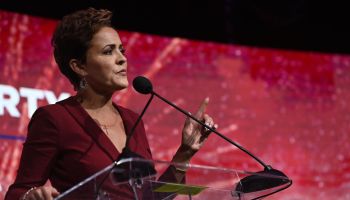LONDON — In a snub to recent ex-presidents and heads of state in Africa, organizers of a multimillion-dollar annual prize for good governance on the continent said Monday they had decided not to give out the award this year.
The Ibrahim Prize for Achievement in African Leadership is awarded only to democratically elected heads of state who have left office in the past three years. That requirement limits the pool of contenders, eliminating the continent’s strongmen leaders, some of whom have held onto power for decades.
The committee considered “some credible candidates” but could not select a winner, said former Botswana President Ketumile Masire, a board member of the group that awards the prize.
RELATED: Obama Tells Africa To Take Responsibility For Problems
Created in 2007 by Sudan-born billionaire Mo Ibrahim, the prize awards $5 million over 10 years and $200,000 annually for life thereafter to encourage leadership that improves the prospects of people in the continent.
Ibrahim was asked at a news conference Monday about politicians who meet the award criteria but were not chosen, including former South African President Thabo Mbeki, former Nigerian President Olusegun Obasanjo and ex-Ghanaian President John Kufuor.
Ibrahim, the founder of the African telecommunications company Celtel International, said the foundation had “full respect” for those leaders. It was unclear why the committee, which is independent of the foundation’s board, was unable to choose one for the prize.
Masire said the foundation “noted the progress made with governance in some African countries, while noting with concern recent setbacks in other countries.” Committee members said they could not discuss their deliberations.
The move surprised some experts, who say the award should be used as an encouragement to good governance.
RELATED: Mugabe Swears in Opponent as Prime Minister
“The way I see it is, it is like the Nobel Peace Prize awarded to Obama,” said Siphamandla Zondi, head of the Africa program at the Institute for Global Dialogue in South Africa. “It is not necessarily meant to make a definitive statement about accomplishments. It should be use to encourage positive tendencies.”
Trying to find the perfect recipient would mean that the award is rarely handed out, said Stephen Chan, a professor of international relations at the School of Oriental and African Studies in London.
“I would imagine that they are thinking about raising the bar and having raised the bar they have found that no one could get over the bar,” he said.
“No one expects African governance to be perfect at this time,” he said.
Others saw it as a wake-up call.
“We’re seeing in places from Senegal to Libya attempts to pass power from father to son, and it’s been a year of coups in places like Madagascar and Mauritania and Guinea,” said Reed Brody, a Brussels-based legal counselor for Human Rights Watch. “It hasn’t been a great year for democracy in Africa. Maybe that’s what they were trying to say.”
Zondi said the prize has a certain amount of status in Africa, but is in danger of not being taken seriously if it is not awarded.
The prize’s past recipients are former Mozambican President Joaquim Chissano and Botswana’s former president, Festus Gontebanye Mogae.
“I made clear when I started the foundation that there may be years when a winner is not chosen and this is such a year,” Ibrahim said.
Asked if the economic crisis had played a factor this year, Ibrahim said the prize committee “don’t pay attention to my bank statement” and was independent of the foundation’s board.
Mbeki was forced to step down last year and hand over power to an interim leader after losing the race for his party’s leadership. The former South African leader, who helped broker Zimbabwe’s unity government deal, was seen by some as favoring longtime Zimbabwean President Robert Mugabe.
Mbeki also was heavily criticized for questioning the link between HIV and AIDS and his failure to act on the epidemic that killed about 300,000 South Africans during his tenure as president.
After serving two terms, Kufuor stepped aside without a fuss, marking Ghana’s second successful hand-over, a milestone not just for the country but also for Africa as whole. However, the opposition at the time accused his administration of corruption.
Another favorite for the award was Obasanjo. Under him, Nigeria had eight tumultuous years of democracy, the longest period since independence from Britain in 1960. But corruption was rife and most of the country’s people have remained desperately poor despite the nation’s oil wealth.
This year’s prize committee was chaired by former U.N. Secretary-General Kofi Annan and included Nobel peace laureate Martti Ahtisaari of Finland, director general of the International Atomic Energy Agency, Mohamed ElBaradei, and former Irish President Mary Robinson.
Robinson said that if it had been a prize for excellence among European leaders this year “we wouldn’t necessarily have so many getting a big prize. That’s all I have to say.”
















